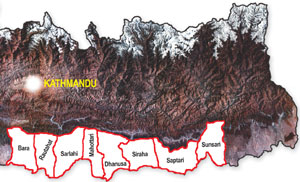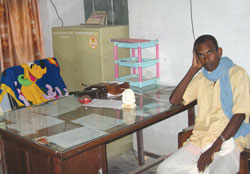|
|
| GOOFY OFFICE: A man waits in the empty office of the District Development Office in Dhanusa on 25 April. The official has fled due to an ultimatum by tarai militant groups. |
The rulers in Kathmandu, preoccupied with giving pro-republican speeches at Tundikhel, don't seem to realise how fast the situation is deteriorating in the mid-eastern tarai. Worse, they appear not to care.
The appearance of pamphlets in the past week by militant tarai groups giving Nepalis of hill origin a two week ultimatum to leave the plains proves they are deliberately igniting ethnic violence to trigger a backlash. The question is: who benefits from such a conflagration and why are the eight parties not showing the urgency to douse it?
Here in the tarai, the threat of ethnic cleansing is now real. The trouble is, it is difficult to tell who is in charge and who to negotiate with. An extremist pamphlet from the self-styled 'Tarai Tiger' group issued two weeks ago gave hill-ethnic civil servants one month to leave the madhes. On Nepali new year's day on 14 April the underground JTMM -Jwala also threatened action against hill-ethnic officials who didn't quit, then the JTMM-Goit in Bara issued a similar threat but gave only a week's deadline.
Bara CDO Bhola Sibakoti says: "Civil servants here are all terrorised by threats from Tarai Tigers, Tarai Cobra, MJF, or the Chure Bhabar Ekata Samaj. Many have simply quit."
To get an idea of just how bad things are, one has to make the rounds of the post office, land revenue office, survey department, land reform and education offices, municipality, or even hospitals. No hill-ethnic bureaucrat is left in most districts: some have taken extended leave, others have requested transfers but most have just fled.
The methods are simple: civil servants of hill origin are first asked to hand over between Rs 25,000-100,000 and if they refuse they are threatened or killed. That is the fate which befell Basudeb Poudel of Kalaiya in Bara who was abducted and killed by the JTMM-Goit on 16 April.
The DDC officer of Bara and director of the Kalaiya municipality were both asked to fork over Rs 500,000 each. Because they didn't have the cash both have fled the district. Bara LDO Bishnu Lamichhane hasn't been in his office for the past two months.

In Sarlahi, Naresh Jha of the Civil Service Organisation told us: "This is worse than it was during the Maoist war." The threats are obviously having their desired effect. Officials in Dhanusa, Sarlahi, Siraha, Mahottari, Rautahat, and Bara report civil servants queuing up waiting for transfers or leaves. Rautahat CDO Durga Prasad Bhandari has put it all in writing and sent a two-page memo to the Home Ministry in Kathmandu.
Kathmandu has reacted by toughening security. Some district administration offices have armed police guards and in Mahottari government offices that had been closed are opening again. The Home Ministry is planning to put 75 additional armed police in each district capital. But many here say it is precisely this attitude in Kathmandu of treating the tarai as a law and order problem that is delaying resolution.
The prolonged closure of district offices has hit ordinary people the most: many wishing to go abroad can't get passports and necessary documents, crossborder trade is at a standstill, sales transactions have stopped.
Bara lawyer Ramkrishna Kafle has been threatened, and says there has been a ciriminalisation of identity politics in the tarai. "It is now clear this is a meticulous and deliberate attempt to disrupt ethnic harmony, and whoever is doing this is trying to provoke a backlash. And it's shameful that politicians of tarai origin philosophise in Kathmandu but don't speak out against the violence here."
It is clear that elections cannot be held in such a terrorised state. And this has made some ask: are the political forces who don't want elections allowing the tarai to fester precisely for that reason?



